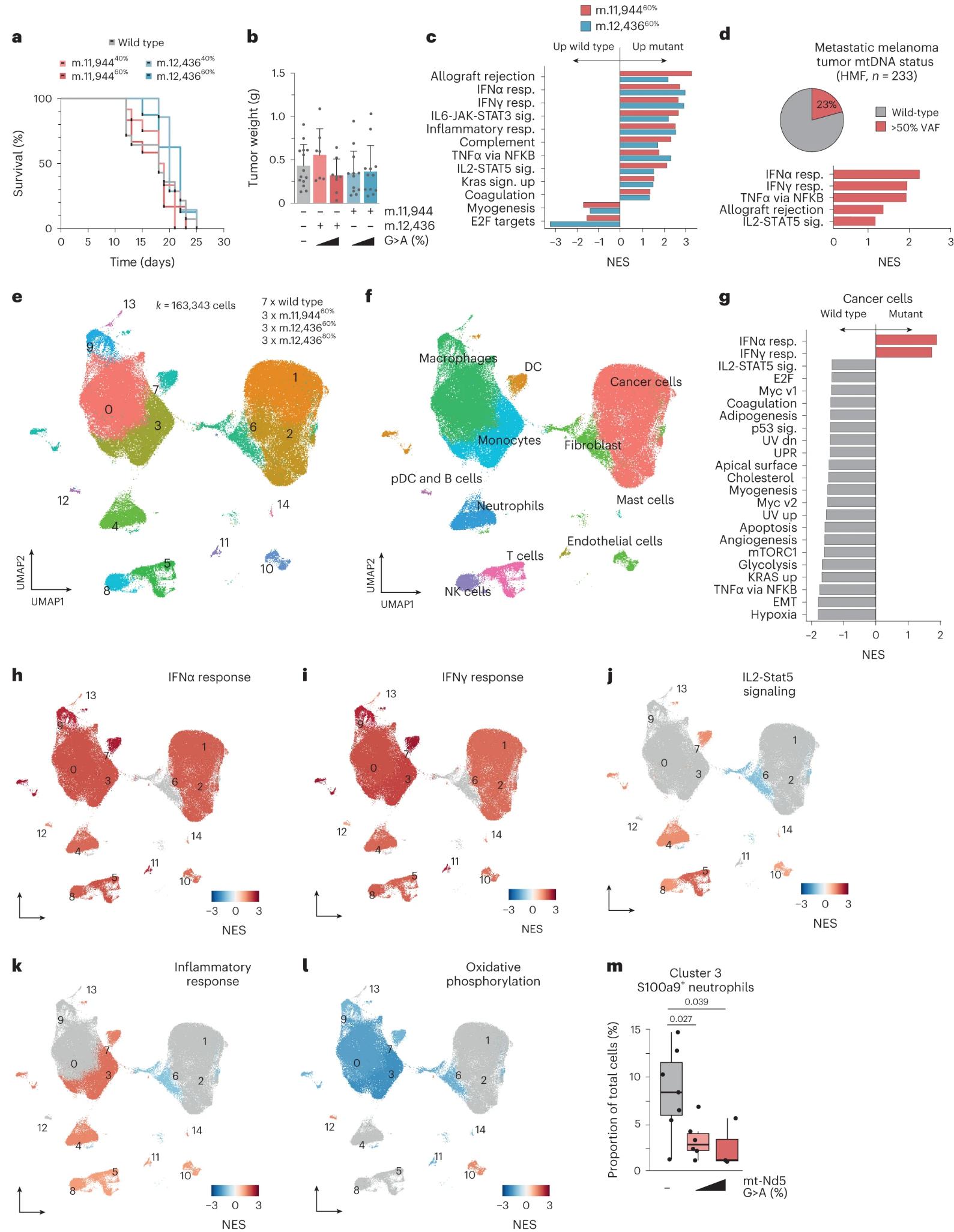The mitochondrial genome (mtDNA) encodes the basic mechanisms of oxidative phosphorylation and metabolic homeostasis. The mtDNA of tumor cells is one of the most mutation-prone regions in cancer genomes. However, there is still some controversy in the scientific community whether these mutations will affect the biological characteristics of tumors.
Recently, in a research report titled "Mitochondrial DNA mutations drive aerobic glycolysis to enhance checkpoint blockade in melanoma" published in the international magazine Nature Cancer, scientists from Cancer Research UK Scotland and other institutions have found that cancer therapies are 2.5 times more effective when tumor cells have defective mitochondria. In the article, researchers "rewired" mitochondrial DNA in living cells. They found that mutations in certain parts of this DNA may determine the cancer's response to immunotherapy, which uses the body's natural defenses to attack cancer cells.
The discovery may open up a new way to identify patients who would benefit from immunotherapy treatment by detecting mitochondrial DNA mutations. Mutations in mitochondrial DNA are present in half of all cancers, and this study is the first to show that researchers may be able to exploit this to improve cancer treatments. In the future, combining therapies that mimic the effects of these mutations with immunotherapies may increase the chances of successful treatment of many cancers.

Figure 1. Tumor mtDNA mutations reshape the immune microenvironment. (Mahmood M, et al., 2024)
In this study, researchers reveal for the first time a direct link between mitochondrial DNA mutations and response to cancer therapy. To the researchers' surprise, they found that tumors carrying high levels of mitochondrial DNA mutations were 2.5 times more likely to respond to an immunotherapy called nivolumab. Nivolumab works by releasing the immune system's brakes to attack cancer cells. It is currently used to treat different cancers, including melanoma, lung cancer, liver cancer and bowel cancer. Scientists believe that in the future they can routinely detect mutations in mitochondrial DNA, allowing clinicians to identify patients who would benefit from immunotherapy before starting treatment.
| Cat.No. | Product Name | Price |
|---|---|---|
| CSC-BS0001 | Rituximab Stable Cell Line - CHO-K1 | Inquiry |
| CSC-BS0002 | Trastuzumab Stable Cell Line - CHO-K1 | Inquiry |
| CSC-BS0003 | Cetuximab Stable Cell Line - CHO-K1 | Inquiry |
| CSC-BS0004 | Nivolumab Stable Cell Line - CHO-K1 | Inquiry |
| CSC-BS0005 | Pembrolizumab Stable Cell Line - CHO-K1 | Inquiry |
| CSC-BS0006 | Adalimumab Stable Cell Line - CHO-K1 | Inquiry |
| CSC-BS0007 | Infliximab Stable Cell Line - CHO-K1 | Inquiry |
The researchers also believe that by simulating the effects of mitochondrial DNA mutations, treatment-resistant cancers may become sensitive to immunotherapy, thereby enabling thousands of cancer patients to benefit from this groundbreaking therapy. The technology behind this discovery has now been patented by Cancer Research UK's innovation team, Cancer Research Horizons, which may also lead to further introduction of the technology to the market, so that new treatments can be developed to destroy the energy source that cancer uses to spread and grow. To date, the team has brought 11 new cancer drugs to market, which have been used in more than 6 million cancer treatments worldwide.
Researcher Payam Gammage said that cancer is a disease of the body's own growth, because cancer cells look similar to healthy cells on the outside, which may make the body's immune system recognize and destroy cancer cells as a very complex task. In summary, the results of this study indicate that mitochondrial DNA mutations may be functional regulators of cancer cell metabolism and tumor biology, which have potential utility in therapeutic development and therapy stratification.
Reference
Mahmood M, et al. Mitochondrial DNA mutations drive aerobic glycolysis to enhance checkpoint blockade response in melanoma. Nature Cancer, 2024: 1-14.

